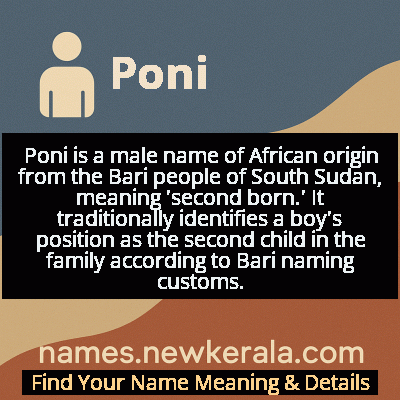Poni Name Meaning & Details
Origin, Popularity, Numerology Analysis & Name Meaning of Poni
Discover the origin, meaning, and cultural significance of the name PONI. Delve into its historical roots and explore the lasting impact it has had on communities and traditions.
Name
Poni
Gender
Male
Origin
African
Lucky Number
9
Meaning of the Name - Poni
Poni is a male name of African origin from the Bari people of South Sudan, meaning 'second born.' It traditionally identifies a boy's position as the second child in the family according to Bari naming customs.
Poni - Complete Numerology Analysis
Your Numerology Number
Based on Pythagorean Numerology System
Ruling Planet
Mars
Positive Nature
Generous, passionate, energetic, and humanitarian.
Negative Traits
Impulsive, impatient, moody, and can be overly emotional.
Lucky Colours
Red, maroon, scarlet.
Lucky Days
Tuesday.
Lucky Stones
Red coral, garnet.
Harmony Numbers
1, 2, 3, 6.
Best Suited Professions
Military, sports, philanthropy, leadership roles.
What People Like About You
Courage, energy, leadership, generosity.
Famous People Named Poni
Poni Jada
Community Leader
Prominent advocate for South Sudanese refugee rights and cultural preservation
Poni Michael
Educator
Founded educational programs for Bari youth in diaspora communities
Poni Lado
Musician
Popular Bari-language musician preserving traditional rhythms with modern influences
Poni Kenyi
Athlete
Represented South Sudan in international track and field competitions
Name Variations & International Equivalents
Click on blue names to explore their detailed meanings. Gray names with will be available soon.
Cultural & Historical Significance
In broader South Sudanese context, names like Poni represent the rich linguistic and cultural diversity of the region. The Bari people, primarily inhabiting Central Equatoria state, have maintained these traditional naming conventions despite colonial influences and modern globalization. The persistence of birth order names demonstrates the resilience of Bari cultural identity and the importance placed on family structure and intergenerational relationships. For many Bari families, choosing traditional names like Poni represents a conscious decision to honor their heritage and maintain cultural distinctiveness in an increasingly interconnected world.
Extended Personality Analysis
Individuals named Poni are often perceived as natural mediators and balanced personalities, reflecting their position as second-born children in traditional Bari culture. They typically demonstrate strong diplomatic skills, able to navigate between different perspectives and find common ground in conflicts. Many Poni-named individuals exhibit reliability and consistency, serving as stabilizing forces within their social circles and families. Their intermediate birth position often translates into excellent teamwork abilities and adaptability, making them valuable collaborators who can both lead and follow as situations demand.
Beyond their mediating qualities, those named Poni frequently develop strong observational skills and emotional intelligence from their bridging role between siblings. They tend to be thoughtful decision-makers who consider multiple viewpoints before acting, and they often excel in roles requiring patience and understanding. While they may not seek the spotlight like firstborns, they possess quiet confidence and the ability to support others effectively. Their personality often blends traditional values with practical adaptability, making them well-suited to navigate both conservative and progressive environments while maintaining their core identity and principles.
Modern Usage & Popularity
In contemporary times, the name Poni continues to be used among Bari communities in South Sudan and the global diaspora, though its usage has evolved with changing social dynamics. While traditionally given specifically to second-born males, modern parents sometimes choose the name for its cultural significance rather than strict adherence to birth order, particularly in urban areas and diaspora communities where traditional practices may be adapting. The name has gained some visibility through South Sudanese diaspora communities in countries like Uganda, Kenya, Australia, and the United States, where it serves as a marker of cultural identity. However, it remains relatively uncommon outside Bari cultural contexts, preserving its ethnic specificity. Recent years have seen a mild resurgence in traditional Bari names like Poni as younger generations seek to reconnect with their cultural heritage, though overall usage rates remain modest compared to more common Arabic or Western names.
Symbolic & Spiritual Meanings
Symbolically, Poni represents balance, mediation, and continuity within family structures. The name embodies the concept of being a crucial link in the chain of generations, carrying forward traditions while adapting to changing circumstances. It symbolizes the importance of every position in the family hierarchy and the unique contributions each member makes to the collective whole. Metaphorically, Poni suggests reliability and steadfastness—like a bridge that connects different elements while remaining firmly anchored. The name also carries connotations of heritage preservation and cultural memory, representing how traditional values and identities are transmitted through naming practices across generations. In a broader sense, Poni symbolizes the idea that significance comes not from being first or most prominent, but from fulfilling one's unique role within a larger system with dedication and integrity.

